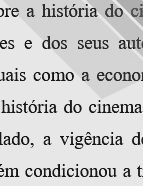

................................
The following publication, Perspectiva do Cinema Português [Perspective of Portuguese Cinema] (Cineclube do Porto, 1951), was another timely work where the author called for a new reflection on the current status of Portuguese cinema from its historical perspective. Some years later, compiling a significant number of texts dispersed across several publications not specialised in cinema, he published À Margem do Cinema Nacional [On the Fringes of National Cinema] (Cineclube do Porto, 1956). However, Manuel de Azevedo's name will always be linked to film societies, both for his outstanding participation in the movement and for his serious first approach to its study in the volume O Movimento dos Cineclubes [The Film Club Movement] (Cadernos Seara Nova [Seara Nova Notebooks], 1948).
The invitation to Manuel de Azevedo by the renowned historian Joel Serrão to collaborate in the important Dicionário de História de Portugal [Dictionary of the History of Portugal] directed by Serrão (Figueirinhas, 1971) is a showcase of Azevedo’s worth as a critic. Proof of recognition of the author's contribution to the study of Portuguese cinema is the entry in this prestigious dictionary on "Cinema in Portugal", which was the first public example of the need to include cinema in the scientific treatment of historiography.
Roberto Nobre, a prominent figure among the cultural opponents of the Estado Novo [New State], was another well-known critic during this period. In addition to writing a number of critical and reflexive texts of a theoretical-aesthetic nature, with occasional participations in various periodicals, Nobre also paid particular attention to the history of Portuguese cinema, devoting a separate work exclusively to this theme: Singularidade do Cinema Português [The Uniqueness of Portuguese Cinema] (Portugália, 1964). Despite reflecting a very personal experience, it contains several methodological alerts that are even more interesting since they come from someone with no historiographical background.
